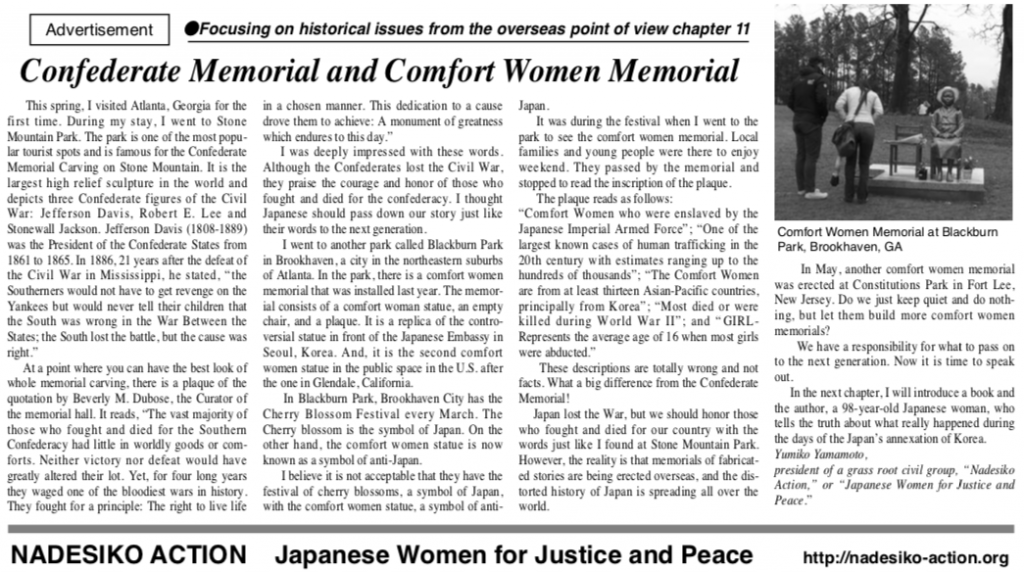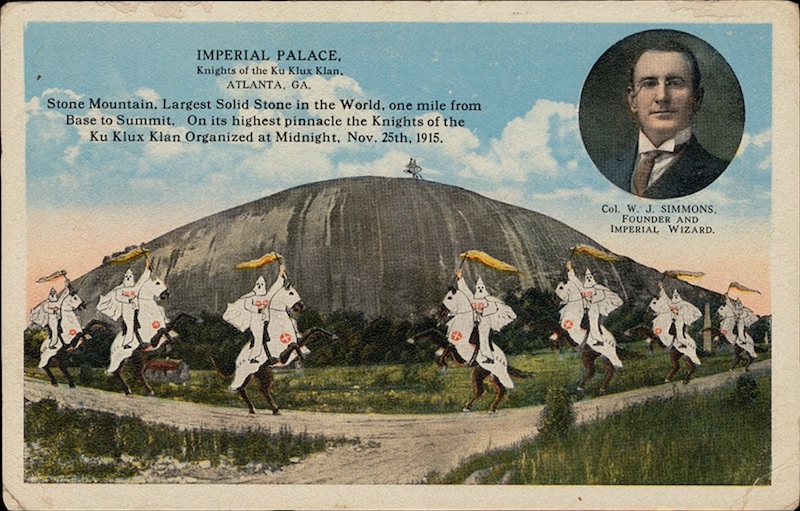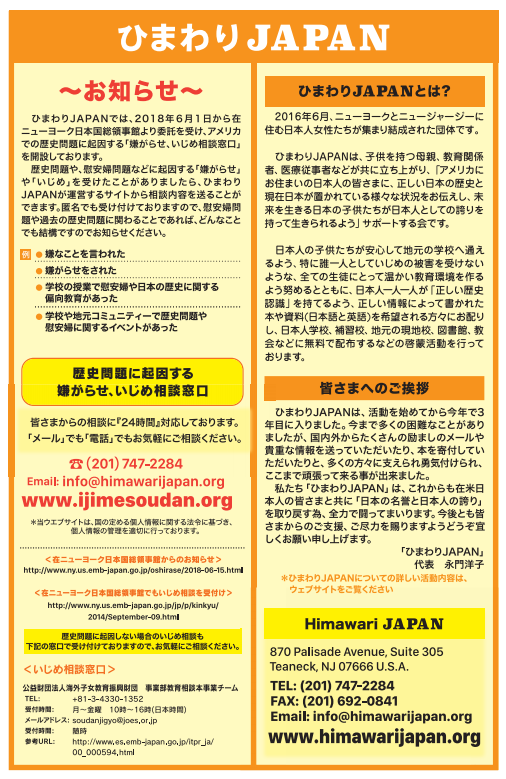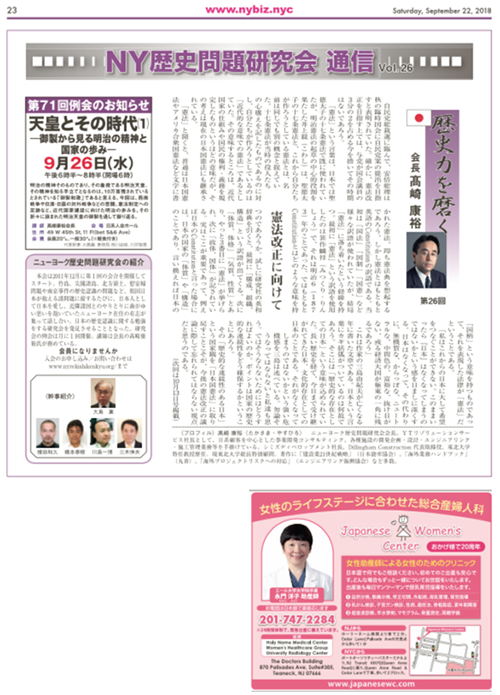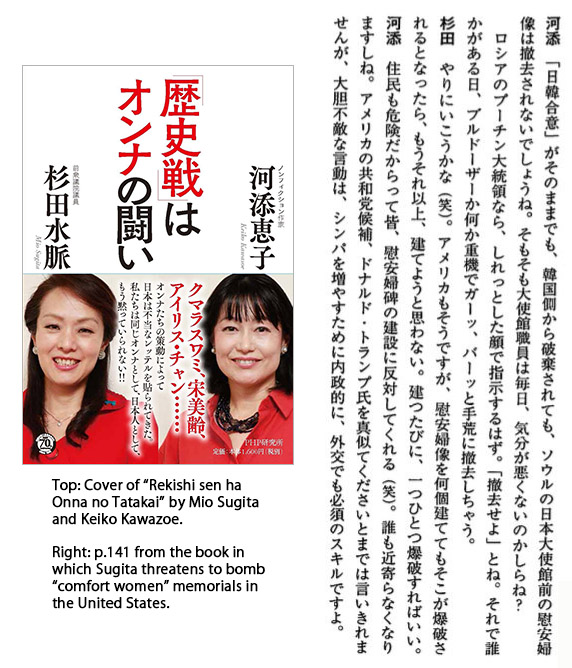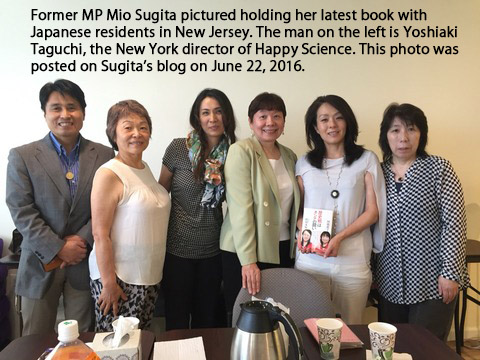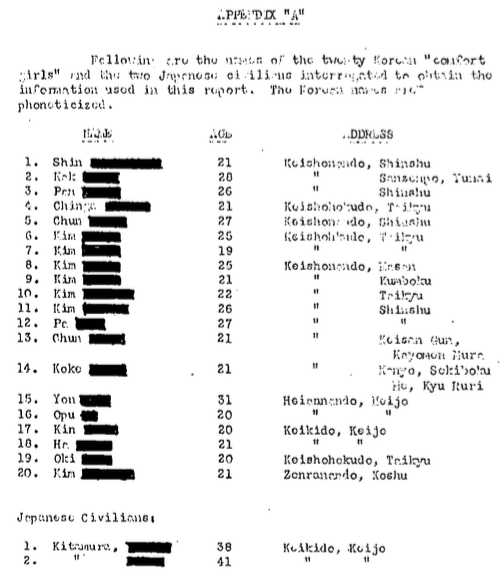| 2006-09-26 |
Shinzo Abe becomes the 90th Prime Minister of Japan |
| 2007-01-16 |
U.S. declassifies documents and releases expert essays on upcoming IWG report |
| 2007-01-31 |
H.Res.121 introduced with six co-sponsors, led by Rep. Mike Honda |
| 2007-03-01 |
PM Abe denies forced recruitment of CW by Japanese military |
| 2007-03-02 |
Deputy Sec. of State Negroponte criticizes Abe’s statement |
| 2007-03-05 |
PM Abe once again denies Japanese military responsibility |
| 2007-03-09 |
Opponents of H.Res.121 change their position, number of co-sponsors grows |
| 2007-03-16 |
Abe administration formally state that no evidence exists that points to forced recruitment of CW by Japanese military |
| 2007-03-24 |
Washington Post criticizes Abe in editorial |
| 2007-03-25 |
Abe’s Deputy Cabinet Minister states on radio that CW were sold by their parents, and that Japanese military was not involved |
| 2007-03-26 |
Deputy Spokesman for Department of State urges Japan to continue to address CW issue |
| 2007-04 |
IWG report finalized and made available to public |
| 2007-04-03 |
U.S. Congressional Research Service releases the report “Japanese Military’s ‘Comfort Women’ System” by Larry Niksch |
| 2007-04-03 |
PM Abe calls Pres. Bush to ask for “understanding” |
| 2007-04-17 |
PM Abe justifies his statements in interviews with Newsweek and Wall Street Journal, promise to uphold Kono Statement |
| 2007-04-20 |
Former Minister of Education and Science Nariaki Nakayama criticizes H.Res.121, arguing that prostitution was legal and profitable at the time |
| 2007-04-27 |
PM Abe visits Pres. Bush, issues a vague apology for CW |
| 2007-05-17 |
Tokyo Governor Shintaro Ishihara denies Japanese military’s involvement in the recruitment of CW |
| 2007-05-25 |
MP Jin Matsubara denies the CW issue |
| 2007-06-14 |
Dozens of conservative politicians and prominent opinion leaders in Japan place a full-page ad (“The Facts”) on Washington Post |
| 2007-06 |
Many members of U.S. House of Representatives join as co-sponsors of H.Res.121 including House Committee on Foreign Affairs Chair Rep. Tom Lantos |
| 2007-07-30 |
U.S. House of Representatives passes H.Res.121 |
| 2007-09-12 |
PM Abe abruptly resigns |
| 2007-11-08 |
Dutch parliament passes resolution urging Japan to confront CW denialism and make further efforts to address the issue |
| 2007-11-28 |
Canada’s House of Commons passes resolution urging Japan to confront CW denialism and make further efforts to address the issue |
| 2007-12-13 |
European Parliament passes resolution urging Japan to confront CW denialism and make further efforts to address the issue |
| 2011-12 |
Yumiko Yamamoto of Zaitokukai forms CW denialist group Nadeshiko Action |
| 2012-05 |
Japanese diplomats offer cherry blossom trees in return for removing Palisades Park, New Jersey CW memorial; the city rejects |
| 2012-05-24 |
Nikon Corp. cancels photo exhibits about CW under right-wing pressure |
| 2012-12-26 |
Shinzo Abe becomes the 96th Prime Minister of Japan |
| 2013-01-10 |
PM Abe appoints Shiro Takahashi to the Council for Gender Equality |
| 2013-05-13 |
Osaka Mayor Toru Hashimoto argues that organized prostitution was necessary at the time, and suggests that the U.S. military should utilize legal sexual services to reduce sexual violence committed by the U.S. servicemen in Okinawa |
| 2013-05-16 |
U.S. Department of State spokesperson Jen Psaki calls Hashimoto’s statement “outrageous and offensive” |
| 2013-05-22 |
San Francisco asks Hashimoto to cancel sister city visit due to the furor caused by his remarks |
| 2013-05-27 |
Hashimoto retracts his comment about the U.S. servicemen while insisting that the Japanese military was not involved in the trafficking of CW |
| 2013-06-18 |
City and County of San Francisco passes resolution condemning CW system in response to Hashimoto’s statements |
| 2013-07-09 |
Glendale, California approves the establishment of CW statue in its Central Park after heated discussions |
| 2013-07-30 |
Glendale unveils the CW statue; Japanese American leaders from Nikkei for Civil Rights and Redress and the San Fernando Valley chapter of Japanese American Citizens League attend in support |
| 2013-09 |
Yumiko Yamamoto and others form Alliance for Truth about Comfort Women |
| 2013-12-16 |
Koichi Mera, Tomoyuki Sumori (True Japan Network, Voluteer Group for Fight Against Comfort Women), and three Japanese MPs (Mio Sugita, Yuzuru Nishida, and Hiromu Nakamaru) meet with representatives of NCRR and JACL-SFV; Sugita dismisses Japanese American representatives as “left-wing” |
| 2014-01-08 |
JACL-SFV chapter formally adopts a statement supporting CW statue in Glendale |
| 2014-01-16 |
Members of (Japanese) National Association of Municipal Legislators Against Comfort Women Statue visit Glendale to protest the CW memorial; they hold a sign that reads “Children Need Heart-Warming Memorials” |
| 2014-02-20 |
Koichi Mera founds Global Alliance for Historical Truth and files a lawsuit against the City of Glendale |
| 2014-05-05 |
Japanese American Bar Association of California and Korean American Bar Association along with dozens of other law associations issue a statement supporting the CW memorial and opposing GAHT’s lawsuit |
| 2014-06-06 |
Japan-U.S. Feminist Network for Decolonization (FeND) formed |
| 2014-06-20 |
Abe administration releases a report on the “process resulting in Kono Statement,” widely seen as a first step to retracting or trivializing it |
| 2014-07-06 |
Mera and Nobukatsu Fujioka of GAHT hold an event in Los Angeles; read a letter from Yamamoto |
| 2014-07-14 |
Yamamoto, Mera, Mitsuhiko Fujii, Shunichi Fujiki, Tony Marano, and other members of ATCW visit Geneva to lobby the U.N. Commission on Human Rights |
| 2014-08-04 |
GAHT’s federal lawsuit against the City of Glendale is dismissed |
| 2014-08-05 |
Asahi Shimbun retracts decades-old articles about forcible CW recruitment by the Japanese military in Jeju Island, Korea |
| 2014-08-13 |
Fullerton, California passes resolution recognizing CW |
| 2014-09-03 |
GAHT files a state suit against the City of Glendale |
| 2014-09-04 |
GAHT appeals the decision of the federal case to the 9th Circuit Court of Appeals |
| 2014-10-15 |
The Historical Science Society of Japan issues a statement criticizing Abe administration’s denial of historical facts of CW |
| 2014-10-30 |
Japanese MPs form the Special Committee to Restore Japan’s Honor and Trust in order to refute allegations on CW |
| 2014-12-13 |
Yamamoto, Mitsuhiko Fujii, and other revisionists hold an event in Redwood City, California near SFO; coalition of peace and human rights activists holds a protest |
| 2014-12-14 |
Yamamoto, Mera, Fujii, and other revisionists hold a panel in Torrance, California |
| 2015-01 |
Japanese Ministry of Foreign Affairs demands American publisher and historian to alter the description of CW in college-level world history textbook |
| 2015-02-18 |
Japanese residents in Los Angeles area join in a lawsuit in Japan against Asahi Shimbun |
| 2015-03 |
20 U.S. historians publish a letter in support of Japanese historians in response to MOFA’s attempt to censor textbooks |
| 2015-03-09 |
Yamamoto, Fujii, Shunichi Fujiki, Shiro Takahashi, and other revisionists hold an event in New York City; original venue, Japanese American Association of New York, cancels their reservation due to a protest by peace and women’s groups |
| 2015-03-10 |
GAHT and ATCW members Mera, Takahashi, and others hold a press conference in NYC to counter the U.N. Commission on the Status of Women sessions |
| 2015-03-17 |
Group of conservative scholars led by Ikuhiko Hata holds press conference to demand “corrections” to an American history textbook over CW |
| 2015-03-27 |
PM Abe refers to CW as victims of human trafficking in an interview with Washington Post without admitting Japanese military’s role in it |
| 2015-04-28 |
Mariko Okada-Collins organizes a screening of Yujiro Taniyama’s film, “Scottsboro Girls” at Central Washington University; Mera, Jason Morgan, and others join Taniyama |
| 2015-04-29 |
PM Abe delivers a speech at the joint session of U.S. Congress without mentioning CW |
| 2015-05-04 |
GAHT’s state lawsuit against the City of Glendale is dismissed; City files for attorney’s fees under anti-SLAPP statute |
| 2015-05-07 |
“Open Letter in Support of Historians in Japan” released with 187 signatures by historians, Japan scholars, and others (mostly in the U.S.); the number of signatories grows to 464 within a week |
| 2015-05-25 |
16 associations of historians and history educators in Japan issue a joint statement criticizing CW revisionism |
| 2015-07-21 |
City and County of San Francisco considers a resolution establishing CW memorial; Mera, Okada-Collins, Terumi Imamura, and others speak in opposition |
| 2015-07-23 |
Osaka Mayor Hashimoto criticizes SF resolution as “unfair,” sends a letter |
| 2015-07-27 |
Nadeshiko Action and ATCW members visit Geneva to lobby the U.N. Convention on the Elimination of Discrimination Against Women |
| 2015-09-22 |
City of San Francisco unanimously passes a resolution establishing CW memorial |
| 2015-10-02 |
MP Yoshiaki Harada, chairman of LDP’s Committee on International Communications, states “our country denies the existence of Nanking Massacre and comfort women” |
| 2015-09 |
MP Kuniko Inoguchi of LDP mails revisionist books to scholars in the U.S., Australia etc., and foreign correspondents based in Japan |
| 2015-11 |
LDP forms new group to review history, particularly war crimes verdicts and GHQ policies |
| 2015-12-18 |
California Department of Education releases a draft of the Social Sciences framework that includes the teaching of CW issues at 10th grade level; historical revisionists start multiple petitions against it |
| 2015-12-28 |
Foreign ministers of South Korea and Japan reach an agreement on CW issue; CW survivors denounce the agreement, while the right-wing is split between those who oppose the agreement and those who support Abe’s decision |
| 2016-01-18 |
PM Abe states that CW were “not sex slaves” in the parliament |
| 2016-02-16 |
Japanese official denies “forcible recruitment of CW by the Japanese military” and sexual slavery at the U.N. Convention on the Elimination of Discrimination Against Women in Geneva; about 30 right-wing activists including Yamamoto, Sugita, Fujiki, Fujii, Hosoya, and others also lobby the CEDAW |
| 2016-03-16 |
Mera,Hosoya, and Sugita hold a panel titled “Misunderstood Comfort Women” at the NGO Parallel Event coinciding with the U.N. Commission on the Status of Women in New York City. |
| 2016-03-17 |
Mera, Hosoya, and Sugita hold a version of the above panel in Japanese for Japanese audience in New York City. |
| 2016-03-23 |
Yamamoto, Fujiki, Fujii, and Norimasa Suzuki (Seiron-no-Kai) hold an event featuring Marano at an Armenian Church. |
| 2016-03-24 |
Yamamoto, Mera, andothers hold another panel at the NGO Parallel Event titled “Women’s Rights Under Armed Conflict: Japan’s Approach to Respect Women.” |

